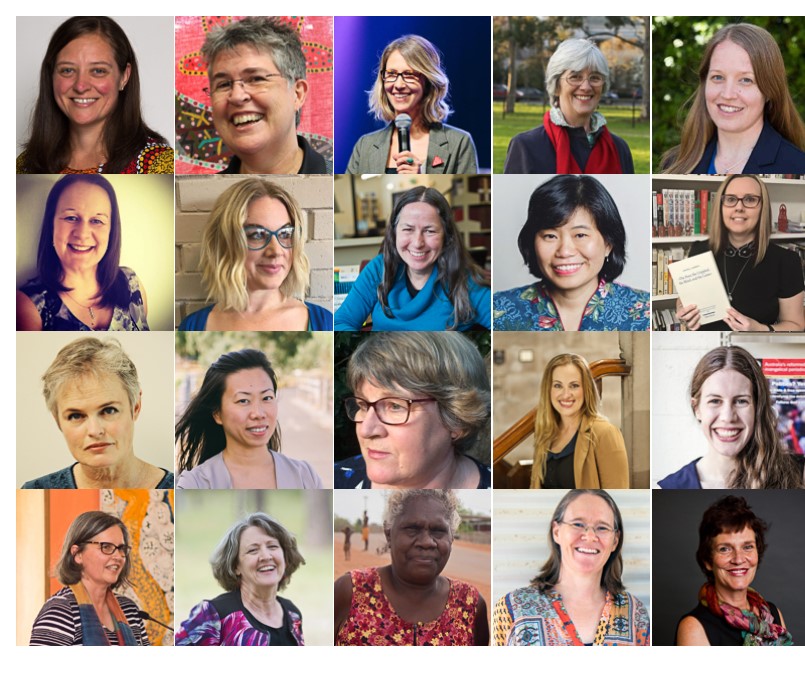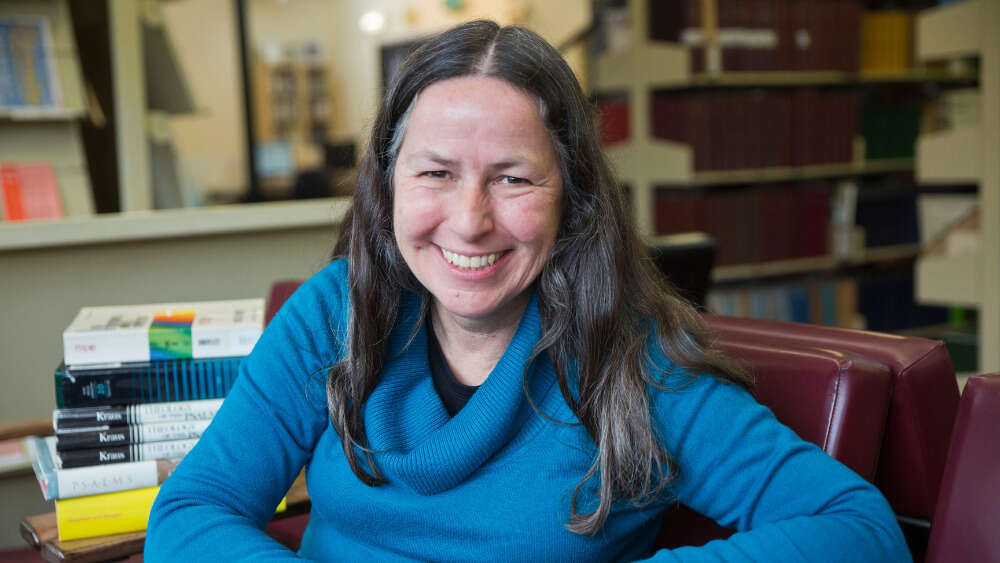“There are no women in my bibliographies!”
This complaint, made by a female music student in 2015, is still largely true today – and the lack of Aussie women scholars is particularly true in evangelical Christian academia.
“There are very few of these women who have a full-time job in academia, even some of the really big players,” says Rev. Dr Jill Firth, co-editor of a new book Grounded in the Body, in Time and Place, in Scripture, which draws together writing from some of the best Australian evangelical women scholars.
“The reason for this dearth of full-time jobs for women, particularly in evangelical colleges, is partly historical,” explains Firth, who is one of the rare women faculty members, as a lecturer in Hebrew and Old Testament at Ridley College in Melbourne.
“In Australia, women didn’t even go to university until the 1880s, whereas men [elsewhere] were getting PhDs at least since the Middle Ages. Then in theological education, it was really at the turn of the century that women starting getting qualified.
“It’s pretty hard to be a theological lecturer if you don’t have the qualification, so the number of women [in this field] has been slow to build up. The numbers are still nowhere near what they are in secular academia.”
“Even in colleges that are very affirming of women, I don’t think there’s anywhere with an equal number of men and women on faculty in Australia.” – Jill Firth
Firth identifies other sticking points that can prevent or delay women from entering into theological academia.
The first is in Sunday school, with some of the messages that girls receive about their role in society and in the church.
“When your child is in Sunday school, do the [teachers] say, ‘Hey, girls, you know you could be a writer one day or you could be the prime minister, you could run a theological college?’ The choice of Bible stories also sometimes hasn’t been Phoebe and Priscilla and all those women,” she says about believers mentioned in the Book of Acts (chapter 18) and Romans (16:1-3).
Just as there are problems at the bottom end of this chain, there are also problems at the top, argues Firth.
“When women are qualified, they may not be able to get a job as a minister, because denominations – or sections of denominations – don’t want preaching from women … Even in colleges that are very affirming of women, I don’t think there’s anywhere with an equal number of men and women on faculty that I know of in Australia.”
“You win in the end because these women are more mature, but it takes a while to get it working.” – Jill Firth
Here, Firth notes that this is not necessarily the college’s fault.
“Colleges I know are trying really hard to recruit women. The fact is there just aren’t so many because of this bottleneck coming in,” she explains. “So you don’t have a big selection of experienced women with PhDs and a large publishing array the way you might have with men.”
“And it’s partly because of the baby thing, where you lose a decade of your life to your babies. So when you’re 35 or 45, your career path might be the same as a 25-year-old man. So people are looking for someone at this career level, but actually the women are 10 years older who are at the same level as men. You win in the end because these women are more mature, but it takes a while to get it working.”
Hearing women’s unique voices
Despite these challenges, more evangelical women are entering into academic discourse in Australia.
Firth is at the heart of this movement. She started a women’s academic writing group through Ridley College (which also runs a women’s preaching network) and spearheads an annual Evangelical Women in Academia (EWA) conference, with two associated Facebook groups.
The conference, which has now run three times, was the catalyst for Grounded in the Body, in Time and Place, in Scripture (co-edited by ethicist and researcher Dr Denise Cooper-Clarke, alongside Firth). Many of its chapters are drawn from papers submitted for the 2019 EWA conference on the same theme.
“We thought it was an academic book, but actually it’s quite well-written so that ‘real’ people can enjoy it.” – Jill Firth
Flowing from the conference, the aim of the book was to provide a platform for these women’s voices to be heard.
“The original reason for doing the book was so that lecturers could say, ‘Here’s a woman on this topic.’ And students could say, ‘I found a woman to read on this topic, and an Australian evangelical woman’ … So that both men and women theological students would see that our Australian women scholars could make essential contributions,” says Firth.
“If you’re in academia, even if you want to be a speaker, people say, ‘Where’s your book?’ So people look at your publications to judge you … I think it’s still how you become an authority. So people will listen to you without any publications because they love you or because you’ve got a good sermon or you’re a good preacher, but to enter into academic discourse, you need publishing.”

The authors of Grounded in the Body.
Firth hopes that the flow-on effect of the book (as well as the other arms of the EWA network) will be to inspire future generations of women to consider a career in theological academia – and to “raise the courage of women to have an idea to put it out there”.
“I think we are part of a movement – and it’s not just us – that’s opening up the space to women so that they feel that what they have to say is worth hearing. So women are thinking, well, I could even publish and present a paper to conference.
“And little kids [may be thinking] my mother published a paper, my sister published a paper, someone I know from my church published a paper in an academic book, rather than just she teaches Sunday school very nicely.”
“This is quite a new wave of research … So we’ve got a few writers who are bringing something really fresh.” – Jill Firth
And while Firth’s priority is to see Christian women get their PhDs and find a permanent place in academia, she has been surprised about the response to Grounded.
“What’s happened is people are buying them for their sisters who are reading it, and people at church and they’re reading it. We thought it was an academic book, but actually it’s quite well-written so that ‘real’ people can enjoy it.
“It’s been a bit of a surprise how popular it is. We just thought there’d be like 41 sold to each academic institution for the library, and a few lecturers and a few students would buy it. But it’s been much more accessible than we had planned, very joyfully.”
Grounded in real spirituality and daily life
One of the main reasons for this accessibility are the real-life experiences that the authors bring to their writing. The writers are deliberately drawn “from everywhere and from every flavour” – across different denominations and different parts of Australia.
“Everybody is working from their experience. Now there’s high academic people who can read Greek and Hebrew or whatever, but the chapters are all pretty much grounded in people’s real spirituality or their daily life,” says Firth.
“All [of the writing] had this flavour of really being engaged as a human being, with God, with different aspects of their real life and with people around them. I’m just blown away by how beautiful that is.”
She continues: “One of the prime examples is Rev. Dr Theresa Yu Lau’s chapter on discipleship, which has to be one of the most exquisite things on discipleship I’ve ever read.”
Dean of Faculty and Development at Melbourne School of Theology Chinese Department, Lau titles her chapter ‘Grounded in His Lordship: Mary, Martha and Me’.
“She kind of works with being a Malaysian woman, and then she works with the Bible and then she bangs it together and comes up with something just superb,” enthuses Firth.
When asked to highlight some of her other favourite chapters, Firth finds it hard to choose between them. She ends up listing quite a few, starting with the chapter by Brooke Prentis, a Wakka Wakka woman and CEO of Common Grace. Her chapter ‘What Can the Birds of the Land Tell Us?’ explores what non-Aboriginal people can learn from our First Nations People about their understanding of the Creator, stewardship and sustainability.
“She’s an extraordinary thinker,” says Firth.
Then there’s the chapter by ethnographer Dr Moyra Dale, titled ‘Purity: Guarding the Body Corporate’.
“She brings all her powers in a way that is just so accessible about purity, menstruation and the body – both individual and corporate.”
“Australian women have got our own richness that we’re bringing [to academic writing] – our lovely care for refugees, care about women, care about Indigenous peoples, care for the earth. These things are part of our DNA.” – Jill Firth
Next she mentions two chapters exploring sensory experience by Dr Louise Gosbell, Dean of Students and lecturer at Mary Andrews College in Sydney, and Rev. Dr Melinda Cousins, head of ministries for South Australia’s Baptist churches and a lecturer at Tabor College.
“Louise wrote on John’s gospel and Melinda wrote on the Psalms, looking at all the senses. They both cite this research that ancient people might have recognised seven or nine senses instead of five because they included things like body movement. This is quite a new wave of research and [Gosbell and Cousins] are riding it. So we’ve got a few writers who are bringing something really fresh.”
There’s not enough time in her interview with Eternity for Firth to endorse chapters by many other women scholars in the book, including Dr Jude Long (Vice Principal Academic at Melbourne School of Theology and Eastern College Australia), Kara Martin (lecturer and author of Workship), Dr Katherine Smith (Principal and lecturer at Mary Andrews College), Dr Tanya Riches (Senior Lecturer at Hillsong College) and Rev. Dr Karina Kreminski (co-head of Neighbourhood Matters). Also, it’s notable that Firth herself delivers two chapters – one answering the intriguing question “Is the God of the Book of Jeremiah Bad for Women?” and a concluding chapter honouring the women who played a part in the history of Australia’s theological academia.
To conclude, Firth sums up the breadth of the current (and coming) wave of Aussie evangelical women in academia – both those included in the book and many more who weren’t.
“Australian evangelical women are fantastic … We’ve got our own richness that we’re bringing [to academic writing] – our lovely care for refugees, care about women, care about Indigenous peoples, care for the earth. These things are part of our DNA.”
“And I think we are good at it. I mean, men are good at it too, but we just want to hear more from the richness of women’s voices.”
Grounded in the Body, in Time and Place, in Scripture, edited by Jill Firth and Denise Cooper-Clarke is part of the Australian College of Theology Monograph Series, published in partnership with Wipf & Stock.
Evangelical Women in Academia is currently calling for papers from Australian and New Zealand evangelical women scholars for its 2021 conference on the theme ‘Persuasion’. Submissions close on March 31, 2021. Find out more information here.



